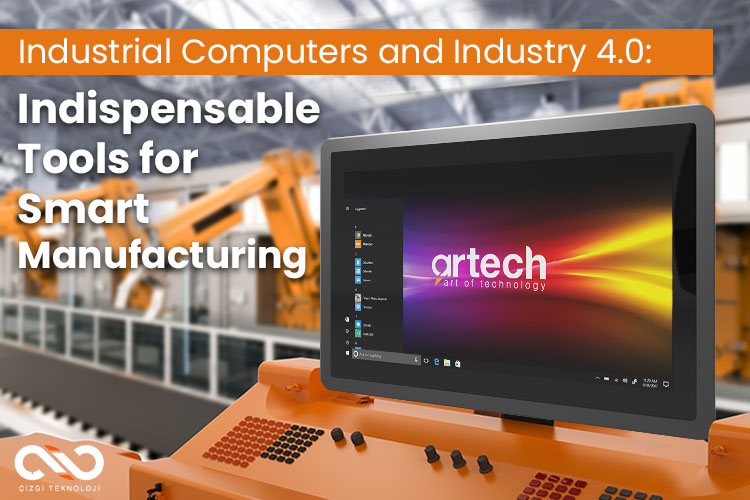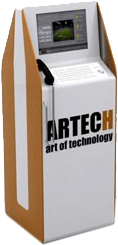Industrial Computers and Industry 4.0- Indispensable Tools for Smart Manufacturing

Industry 4.0 is a period of rapid technological advances in industrial sectors today. This transformation has led to the widespread use of technologies such as digitalisation, automation, data analysis and artificial intelligence in production processes. Industry 4.0 is an approach that enables the emergence of smart factories and aims to optimise production processes.
Smart manufacturing is an approach in which technology is used effectively to automate and increase the efficiency of industrial processes. This approach is at the centre of Industry 4.0. Smart manufacturing makes factories more flexible, efficient and competitive while quickly adapting to customer demands and market changes.
One of the critical components of Industry 4.0 is industrial computers. Industrial computers are indispensable tools for managing and controlling intelligent production processes. These computers are durable and reliable devices designed to operate in harsh industrial environments. It is seen that industrial computers play a critical role in Industry 4.0 and smart manufacturing processes and make significant contributions in areas such as production efficiency, automation and data analysis. In the future of smart factories, industrial computers will be the main tools that support the success of industrial sectors with their reliability and durability.
I. Industry 4.0 and Smart Manufacturing
The increasing importance of smart production processes
With Industry 4.0, the importance of smart production processes has dramatically increased. Smart production replaces traditional methods and provides a more efficient, flexible, and sustainable environment.
The main objectives of smart manufacturing are to optimise production processes, reduce errors and gain competitive advantage. Industrial computers play a critical role in achieving these goals.
- Optimisation: Industrial computers are essential for making production processes more efficient. These computers can collect, analyse and process production data in real-time. In this way, production processes are made more efficient, unnecessary labour and energy consumption are reduced, production capacity is increased, and costs are reduced.
- Error reduction: Industrial computers are essential in reducing errors in production processes. By continuously collecting data through sensors, they can detect potential errors in production processes and intervene immediately. In addition, industrial computers, supported by artificial intelligence algorithms, minimise production interruptions by predicting equipment failures with techniques such as predictive maintenance.
- Competitive advantage: Implementing intelligent production processes gives companies a competitive advantage. Industrial computers enable production processes to be faster, more flexible and more efficient, providing better responsiveness to customer demands. In addition, data analysis identifies the potential for improvement in production processes and provides more robust data-based information for decision-making.
II. The Role of Industrial Computers
Industrial computers are one of the essential elements
In the Industry 4.0 era, industrial computers have become one of the vital elements of production processes. These computers play a crucial role in the realisation of smart production processes by enabling the effective use of digital technologies in the production environment. Industrial computers have hardware and software components optimised for industrial automation, data acquisition, control and management systems.
Durability and reliability features of industrial computers
- Durability: Industrial computers are designed to provide durability in harsh manufacturing environments. These computers are generally protected against dust, moisture, vibration, shock, and temperature extremes. Industrial PCs also utilise industrial-grade components and rugged chassis construction to ensure long-lasting operation.
- Reliability: Industrial computers offer high reliability for critical requirements such as uninterrupted operation and data integrity. These computers can operate without data loss, even during power surges or interruptions. They are also protected against electrical interference in a production environment.
- Wide temperature range: Industrial computers are generally capable of operating over a wide temperature range. They can operate stably even at very low or very high temperatures. This feature makes it possible to use them in different industrial environments.
- IP ratings: Industrial computers usually have IP (Ingress Protection) ratings. The IP rating indicates a device's protection level against dust, moisture, water and other external factors. For example, an IP65 rating indicates a computer is entirely dust-proof and resistant to water jets. These features ensure reliable performance in industrial environments.
- Vibration and shock resistance: Industrial computers are designed to withstand vibration and shock; This ensures that they can operate without interruption, even in vibrating or moving environments in production processes. In addition, their shock resistance ensures that they are not damaged even in the event of possible bumps or falls.
- Flexibility: Industrial computers offer flexibility to adapt to different industrial applications. They can operate over a wide temperature range and have different input/output interfaces. They can also be easily integrated into different production environments thanks to various mounting options and expandability features.
- Data Security: Industrial computers take extraordinary measures to ensure data security in production processes. These include hardware-based security features, data encryption, access control and network security. This way, sensitive production data is protected, and the risk of unauthorised access or data loss is minimised.
These features are essential differences that distinguish industrial computers from conventional office computers.
III. Functions of Industrial Computers
Industrial computers can fulfil several essential functions in industrial environments. Here are the main functions of industrial computers:
- Automation and control processes: Industrial computers are central to automation and control systems. These computers can generate and receive control signals to manage factory machinery and automate and optimise production processes. In this way, production processes become more efficient, the error rate is reduced, and the production line is better managed.
- Data collection and analysis capabilities: Industrial computers can collect and analyse large amounts of data from production processes. Data from sensors, instruments and other production equipment is processed and analysed through industrial computers. The analysis of this data can be used to evaluate performance in production processes, detect errors, identify opportunities for improvement and support future decisions.
- IoT integration and communication with sensors: Industrial computers can integrate with IoT (Internet of Things) technology and communicate with various sensors. IoT is a technology that enables industrial equipment and devices to connect with networks. Industrial computers can receive and analyse data from these sensors and take appropriate actions. For example, using data from a temperature sensor, it can monitor the operating temperature of a machine and automatically make adjustments when necessary.
IV. Application Areas of Industrial Computers
Industrial computers have different application areas in various sectors. Here are some application areas where industrial computers are widely used:
- Automotive industry: Industrial computers play an important role in automotive manufacturing. They are used for the management of production lines. These computers can perform tasks such as monitoring production processes, productivity analysis, fault detection and quality control. Industrial computers also control robots and other automation systems in automotive factories.
- Energy sector: Industrial computers are used for distribution network management in the energy sector. These computers can efficiently manage and distribute energy resources such as electricity, gas or water. In addition, industrial computers are also preferred for the collection, analysis and control of data in energy production and distribution.
- Production and manufacturing sector: Industrial computers are used for efficiency and quality control in the production and manufacturing sectors. They are preferred for monitoring, data collection, analysis and optimisation of production processes. Industrial computers can also automate production lines and manage factory operations.
- Logistics and distribution: Industrial computers are used for warehouse management in the logistics and distribution sector. They can perform tasks such as receiving and storing products, tracking inventory and managing shipments. These computers integrate with warehousing systems, barcode readers and other automatic recognition devices to ensure efficient and error-free warehouse operations.
- Food and beverage industry: Industrial computers are used for production process control in the food and beverage industry. They can be used in tasks such as managing production lines, controlling temperature and humidity, and monitoring processing processes. These computers play an essential role in meeting food safety and quality standards.
V. Smart Manufacturing and Industrial Computers
In the Industry 4.0 process, industrial computers have a central role in factory automation. These computers provide data sharing and control by integrating with other automation devices on production lines. In this way, production processes become more innovative and more efficient.
Industrial computers also play an important role in integration with robotic systems. These computers, which control and coordinate robots, ensure that robots operate correctly. It also communicates with sensors and analyses data, which is necessary for robotic systems to operate efficiently and safely.
In the Industry 4.0 process, industrial computers also play an important role in predictive maintenance processes. These computers can predict failure risks by analysing data from sensors in production equipment. In this way, maintenance processes are managed more effectively and in a planned manner, unexpected downtime is reduced, and production continuity is ensured.
This role of industrial computers in smart manufacturing contributes to optimising production processes, reducing errors and gaining a competitive advantage. With their data collection, analysis, control and management capabilities, these computers help successfully implement the critical elements of Industry 4.0.
VI. Conclusion
In the Industry 4.0 process, industrial computers are indispensable in smart production processes.
Industrial computers contribute to smart production processes with automation, data collection and analysis capabilities. In addition, topics such as integration with robotic systems, predictive maintenance processes and security measures were also discussed. Industrial computers have broad application areas in various sectors, such as the automotive, energy, production, manufacturing, logistics, distribution, and food and beverage industries.
As a result, industrial computers are one of the critical elements of Industry 4.0 with their importance and indispensability in smart production processes. Using suitable industrial computers allows businesses to optimise their production processes, increase productivity and gain a competitive position. In this way, they can create a sustainable production environment and adapt to future industrial developments.
VII. ARTECH Industrial Computer Solutions
As Çizgi Teknoloji, we offer durable and reliable industrial computer solutions with solid performance under our ARTECH brand. Our products are carefully designed following the unique needs of industrial sectors and have superior features that will fully meet the needs of businesses in the Industry 4.0 transformation.
Please click on the link below to review our Artech Industrial Computer product group and discover our solutions suitable for your business needs:
Artech Industrial Computer Products
With reliable performance, durability and advanced features, ARTECH industrial computers offer a solid foundation as an indispensable tool in smart manufacturing processes.



 English
English
 TR
TR